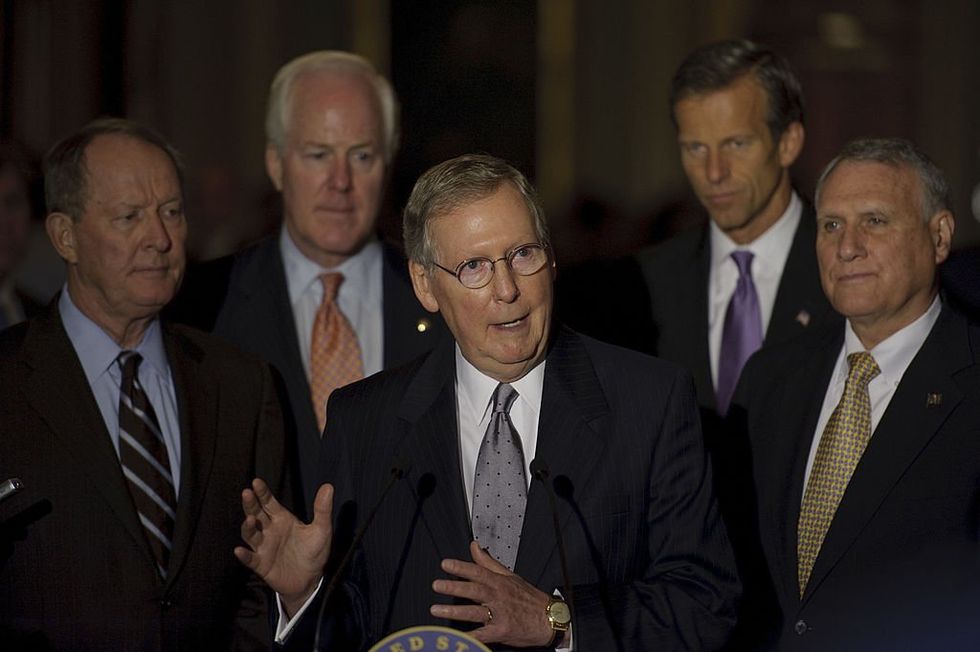The race for who leads Washington
The Senate returns to session Tuesday. The new members will be there too. They’ll have a candidate forum Tuesday night, where the men vying for Senate Republican leadership will make their case, and on Wednesday, the GOP senators and senators-elect of the 119th Congress will choose their next leader. It’s an important job. Under Mitch McConnell (R-Ky.), power and money have become more and more centralized while the Senate’s regular order has been pushed aside — and along with it, the power of Senate committees and their chairmen to seriously shape policy. Inside the Senate, support can be mercurial ... and how much does ideology play into it anyway? And while the House of Representatives has its essential role in governance, and though its members are generally more raucous and more conservative than their counterparts in the upper chamber, you can expect all that to calm down in the next Congress. When the same party controls both chambers and the presidency, it’s business time — and the House tends to follow the Senate’s lead without all the drama of the last four years. So Senate majority leader? Important role. The candidates are Sens. John Thune (S.D.), John Cornyn (Texas) and Rick Scott (Fla.). That’s two men with moderate, leadership-friendly records and a self-made billionaire known for angering McConnell and generally shaking things up. While the Republican base might have its favorite in that kind of race, the Senate is an entirely different animal. For months, D.C. has called Thune the leader, Cornyn a possibility, and Scott a conservative protest run meant to pull concessions from the eventual leader, but not much backs this up aside from an aggressive, behind-the-scenes campaign by Team Thune to make it seem that way. Granted, Thune and Cornyn fit the mold. Both have long been close to leadership (and less close with conservatives). Cornyn in particular has built a fundraising juggernaut with which he’s generously supported his colleagues (an important thing in an insular popularity contest). While lacking the treasure chest, Thune aggressively campaigned for his fellow Republicans throughout the last election. Scott has largely gone his own way, but over the past couple of years, he has distinguished himself for his willingness to challenge McConnell’s very un-MAGA agenda and also put forward an actual agenda (however unpopular with his colleagues) for Republicans to run on. But it’s a secret vote, so no one actually knows who to hold responsible for what. As retired Sen. Lamar Alexander quipped in his December 2020 farewell address, in 2006, “I wrote 27 thank-you notes for 24 votes when I lost the race by one vote to be the Republican whip.” The secret vote can be important. It allows senators to avoid retribution for opposing the eventual winner. It can also shield them from the influence of one president-elect, Donald J. Trump. While thus far Trump has declined to weigh in on the race, it is well in his interest to have a Senate majority leader he can work with for once. Members of his camp know this, and leaks and barbs are circulating Capitol Hill undermining this or that candidate. For example, a video started shooting between staffers and members this week showing five clips of Thune speaking ill of Trump, followed by a clip from earlier in the week of the senator warning Trump away from trying to influence the election, and ending with a tweet by Donald Trump Jr. attacking both Thune and Cornyn as establishment liberals. Then there’s the Axios piece last week reporting that months prior, Trump dismissed Scott as an unserious contender. Trump spokesmen denied it, but the point is blood is in the water. And if Trump wouldn’t have any impact on the election, why would Thune feel the need to warn him off? If he was comfortable in the big man’s support — or confident it wouldn’t have an impact — he would have invited it. (Though he has been courting the once and future president and, just as with Scott and Cornyn, is in frequent contact with him.) Inside the Senate, support can be mercurial. While Sen. Markwayne Mullin (Okla.) joined Thune’s South Dakota colleague Mike Rounds in their support, Sen. Josh Hawley, a populist conservative from Missouri, announced his support Friday for Cornyn’s bid. Why? Cornyn apparently promised to support Hawley’s mission to get a bill covering federally caused radiation exposure for citizens of all 50 states through the Senate. Earlier this year, others on the fiscal right had offered to expand the bill to cover states including Missouri, but Hawley wanted all 50 states covered. Scott voted against that. The end. And how much does ideology play into it anyway? Cornyn has taken a couple of stands in his life, including for the now-unpopular criminal justice reform. Do conservatives want a strong speaker who doesn’t share their views or one who is more malleable to the current mandate — a mandate Trump clearly earned? In all but two st


The Senate returns to session Tuesday. The new members will be there too. They’ll have a candidate forum Tuesday night, where the men vying for Senate Republican leadership will make their case, and on Wednesday, the GOP senators and senators-elect of the 119th Congress will choose their next leader.
It’s an important job. Under Mitch McConnell (R-Ky.), power and money have become more and more centralized while the Senate’s regular order has been pushed aside — and along with it, the power of Senate committees and their chairmen to seriously shape policy.
Inside the Senate, support can be mercurial ... and how much does ideology play into it anyway?
And while the House of Representatives has its essential role in governance, and though its members are generally more raucous and more conservative than their counterparts in the upper chamber, you can expect all that to calm down in the next Congress. When the same party controls both chambers and the presidency, it’s business time — and the House tends to follow the Senate’s lead without all the drama of the last four years. So Senate majority leader? Important role.
The candidates are Sens. John Thune (S.D.), John Cornyn (Texas) and Rick Scott (Fla.). That’s two men with moderate, leadership-friendly records and a self-made billionaire known for angering McConnell and generally shaking things up. While the Republican base might have its favorite in that kind of race, the Senate is an entirely different animal.
For months, D.C. has called Thune the leader, Cornyn a possibility, and Scott a conservative protest run meant to pull concessions from the eventual leader, but not much backs this up aside from an aggressive, behind-the-scenes campaign by Team Thune to make it seem that way.
Granted, Thune and Cornyn fit the mold. Both have long been close to leadership (and less close with conservatives). Cornyn in particular has built a fundraising juggernaut with which he’s generously supported his colleagues (an important thing in an insular popularity contest). While lacking the treasure chest, Thune aggressively campaigned for his fellow Republicans throughout the last election. Scott has largely gone his own way, but over the past couple of years, he has distinguished himself for his willingness to challenge McConnell’s very un-MAGA agenda and also put forward an actual agenda (however unpopular with his colleagues) for Republicans to run on.
But it’s a secret vote, so no one actually knows who to hold responsible for what. As retired Sen. Lamar Alexander quipped in his December 2020 farewell address, in 2006, “I wrote 27 thank-you notes for 24 votes when I lost the race by one vote to be the Republican whip.”
The secret vote can be important. It allows senators to avoid retribution for opposing the eventual winner. It can also shield them from the influence of one president-elect, Donald J. Trump. While thus far Trump has declined to weigh in on the race, it is well in his interest to have a Senate majority leader he can work with for once. Members of his camp know this, and leaks and barbs are circulating Capitol Hill undermining this or that candidate.
For example, a video started shooting between staffers and members this week showing five clips of Thune speaking ill of Trump, followed by a clip from earlier in the week of the senator warning Trump away from trying to influence the election, and ending with a tweet by Donald Trump Jr. attacking both Thune and Cornyn as establishment liberals.
Then there’s the Axios piece last week reporting that months prior, Trump dismissed Scott as an unserious contender. Trump spokesmen denied it, but the point is blood is in the water. And if Trump wouldn’t have any impact on the election, why would Thune feel the need to warn him off? If he was comfortable in the big man’s support — or confident it wouldn’t have an impact — he would have invited it. (Though he has been courting the once and future president and, just as with Scott and Cornyn, is in frequent contact with him.)
Inside the Senate, support can be mercurial. While Sen. Markwayne Mullin (Okla.) joined Thune’s South Dakota colleague Mike Rounds in their support, Sen. Josh Hawley, a populist conservative from Missouri, announced his support Friday for Cornyn’s bid. Why? Cornyn apparently promised to support Hawley’s mission to get a bill covering federally caused radiation exposure for citizens of all 50 states through the Senate. Earlier this year, others on the fiscal right had offered to expand the bill to cover states including Missouri, but Hawley wanted all 50 states covered. Scott voted against that. The end.
And how much does ideology play into it anyway? Cornyn has taken a couple of stands in his life, including for the now-unpopular criminal justice reform. Do conservatives want a strong speaker who doesn’t share their views or one who is more malleable to the current mandate — a mandate Trump clearly earned? In all but two states a Republican senator won, Trump beat their winning tally by tens to hundreds of thousands of votes.
Then, Cornyn is courting conservatives you might imagine would otherwise vote for Scott. The day after Trump’s election, he released a statement promising a return to normal order in the Senate, including empowering committees — two things far more important to empowering the legislature than term limits for leadership (though he’s supported these as well). Another point in his favor? He has his own fundraising team and won’t be reliant on the McConnell people in quite the same way Thune would be.
Scott is the only one of them to put pen to paper and write out a plan for what the Republican Senate should be fighting for. That courage has been in short supply over the past five years in D.C. But will it make a difference now that Trump is back and his agenda is the agenda?
All this and more will be hashed out in behind-the-scenes negotiations this week, though true to fashion, McConnell’s team didn’t want even that to happen. He's getting a lifetime achievement award from the thoroughly anti-MAGA American Enterprise Institute Tuesday night, and Utah Sen. Mike Lee’s candidate forum is disrupting the celebration. It's perfect, really.
Blaze News: How Tim Scott plans to capitalize on GOP Senate gains
Glenn Beck: ‘A true rebirth of freedom’: Why Glenn Beck is ‘really hopeful’ about Trump's second term
Sign up for Bedford’s newsletter
Sign up to get Blaze Media senior politics editor Christopher Bedford's newsletter.
IN OTHER NEWS
Goodbye (for now)
I'm absolutely thrilled to report that Sarah Bedford gave birth to a beautiful daughter Saturday morning. While I barely — I mean, barely — missed becoming a midwife, these next four weeks I’ll be tending to a healthy mom and healthy baby girl. God willing, you’ll hear from me again the week of Dec. 9. Until then!
Originally Published at Daily Wire, World Net Daily, or The Blaze
What's Your Reaction?

































































































